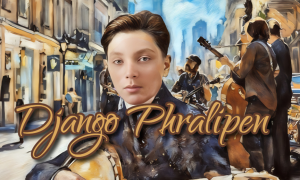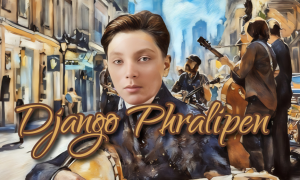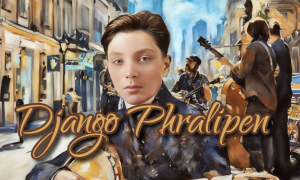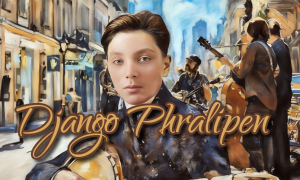Home » Jazz Articles » Django's Cosmic Echo » Chapter Ten: Blueprints and New Blood
Chapter Ten: Blueprints and New Blood
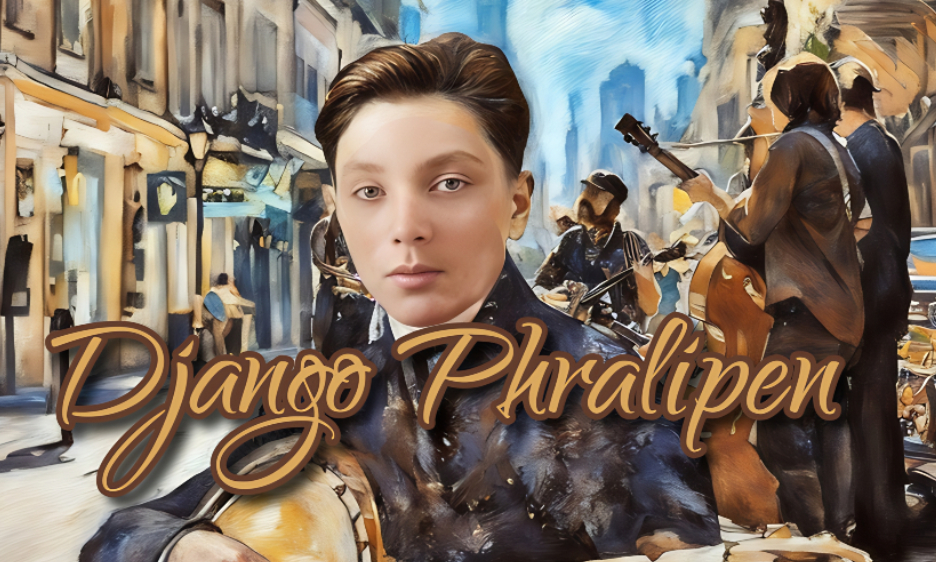
Courtesy AI
Chapters
1 | 2 | 3 | 4 | 5 | 6 | 7 | 8 | 9 | 10 | 11 | 12 | 13 | 14 | 15 | 16 | 17 | 18The Monday meeting with Mr. Alistair Finch, the solicitor Ronnie Scott had recommended, was a refreshingly straightforward affair. Finch, a dapper man with a keen eye for contractual nuance, confirmed Dirk's assessment: the EMI offer was not only generous but also remarkably artist-friendly, especially concerning creative control. A few minor clauses were tightened for clarity, but by Tuesday afternoon, Dirk and Django were back at EMI headquarters.
The signing itself was less a grand ceremony and more a quiet, momentous occasion in a wood-paneled office. Geoff Litchman, looking genuinely pleased, presented the finalised contracts. Django, with Dirk by his side, put pen to paper, the scratch of nib on parchment echoing slightly in the room. A handshake, a shared smile. It was done. Django Phralipen was officially an EMI artist.
Before leaving London, there were practicalities. Geoff Litchman, eager to build on the Ronnie Scott's buzz, had quickly arranged an interview for Django with a young, enthusiastic journalist from Rolling Stone magazine's nascent UK bureau. Django, coached by Dirk to be humble yet articulate, considered his words carefully. When asked about future directions, he said, his English careful but heartfelt, "Music is the one language we all understand. Right now I'm looking to work with those who speak it fluently... In my mind I hear a female voice, and in a perfect world she would play flute with soul and great chops, adding another colour to our sound." Then, armed with a significant portion of their advance, Django and Dirk led the Brotherhood on a strategic shopping spree. New amplifiers, a couple of choice effects pedals for Django, sturdier drum hardware for Lars, and even some stylish, understated stage clothes were acquired. They were beginning to look, as well as sound, like a band on the precipice of something big.
Their return to Amsterdam was quiet but charged with a palpable sense of achievement. Dirk's record shop, once just a haven, now felt like the command centre for an exciting new enterprise. One of Dirk's first moves was to hire a reputable accountant and a sharp young business manager to navigate the increasingly complex legal and financial waters. "My job is to help you make music, Django," Dirk had said. "Their job is to make sure you get to keep making it."
The band didn't rush back onto the stage. Instead, they rented a disused warehouse space on the city's outskirts—a large, dusty building that quickly became their sanctuary and laboratory. Django had more ideas. "I hear more rhythm," he declared one afternoon. "More layers." Soon, a nimble conga player named Rico, a fixture in Amsterdam's Latin jazz scene, and a versatile percussionist, Anya, who could coax a symphony from a collection of shakers, bells, and blocks, were invited to jam. The core Brotherhood—Dave, Lars, Leo, and Stefan—watched, listened, and then eagerly joined in, the sound of the band instantly expanding, becoming richer, more polyrhythmic, and undeniably more global.
Meanwhile, Dirk was working the phones. Reaching

Toots Thielemans
harmonica1922 - 2016

Quincy Jones
arranger1933 - 2024
Album plans solidified. The live/studio concept remained. The live portion would be a triumphant headline show at Paradiso—"Django Phralipen Brotherhood: The Homecoming Concert," EMI agreeing to bring in a top-tier mobile recording unit. Studio time was booked at Abbey Road for the weeks following.
Thousands of miles away, in Dallas, Texas, Barbara "Bobbi" Holloway, a whip-smart eighteen-year-old who had just graduated high school and whose flute playing already possessed a maturity and soulful depth far beyond her years, picked up a copy of Rolling Stone. Django Phralipen's interview caught her eye. "A female voice... flute with soul and great chops... " Her heart leaped. This was her. She'd been devouring jazz, funk, and soul, honing her instrumental skills, dreaming of a bigger stage.
Getting Django's attention became her mission. She wrote a passionate letter, enclosing a raw demo tape she'd made with some local musicians, and sent it to EMI Records, Manchester Square, London, addressed to "Django Phralipen, c/o Mr. Geoff Litchman." Weeks passed. Undeterred, she remembered the article mentioning Ronnie Scott's. She found the club's number through an international operator, called, and, with a blend of youthful charm and sheer persistence, managed to get the number for Dirk's record shop in Amsterdam. One rainy Amsterdam afternoon, the phone in Dirk's shop rang. Dirk, expecting a supplier, was surprised to hear a young American woman's voice, articulate and confident, asking for Mr. Phralipen's manager. She introduced herself as Bobbi, a flutist and singer. She mentioned the Rolling Stone article, the letter to EMI. Dirk, recalling a recently forwarded package from Litchman containing a letter and a slightly battered cassette, put two and two together. That evening, Dirk played the tape for Django in the quiet of the closed shop. The recording quality was rough, but through the hiss, a flute soared—soulful, inventive, tight, with a funky groove. Then a voice, clear and expressive, sang a scat chorus. Django listened intently, a slow smile spreading across his face. "She has it, Dirk," he said, his eyes shining. "The soul jazz, the chops. She understands."
Dirk nodded. "She sounds determined. And very talented." "Get her a plane ticket, Dirk," Django said decisively. "Tell her to come to Amsterdam. Let's see if the Brotherhood can become a... family."
Story by Alan Bryson, edited and assisted by AI.
Disclaimer: This is a fictional account exploring what might have happened if a temporal quantum event had occurred. While real musicians and historical figures appear within these pages, they exist here in an alternate timeline—a reality that quantum theory suggests was possible, but that never came to pass. All interactions, conversations, and events involving these individuals are entirely fictional, products of a world that exists only in the space between what was and what might have been.
Tags
Comments
PREVIOUS / NEXT
Support All About Jazz
 All About Jazz has been a pillar of jazz since 1995, championing it as an art form and, more importantly, supporting the musicians who make it. Our enduring commitment has made "AAJ" one of the most culturally important websites of its kind, read by hundreds of thousands of fans, musicians and industry figures every month.
All About Jazz has been a pillar of jazz since 1995, championing it as an art form and, more importantly, supporting the musicians who make it. Our enduring commitment has made "AAJ" one of the most culturally important websites of its kind, read by hundreds of thousands of fans, musicians and industry figures every month.




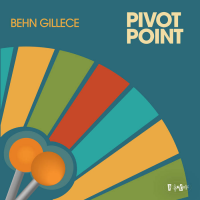



 Buy Now
Buy Now




